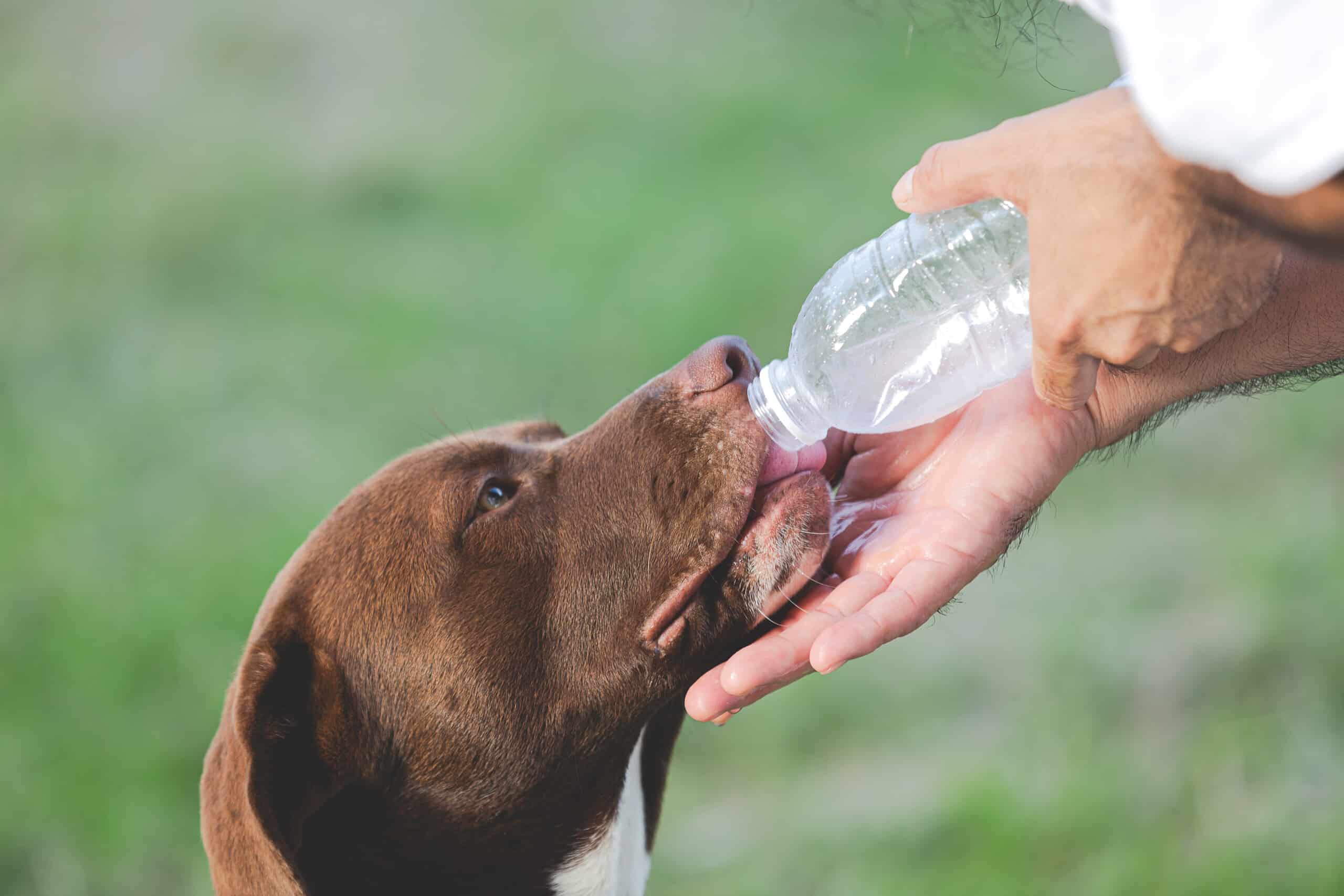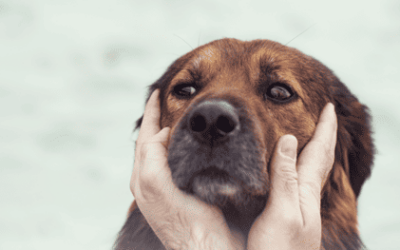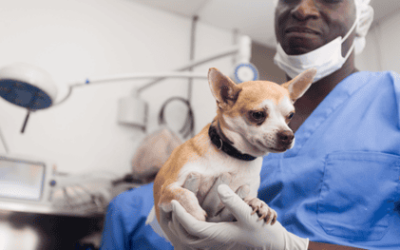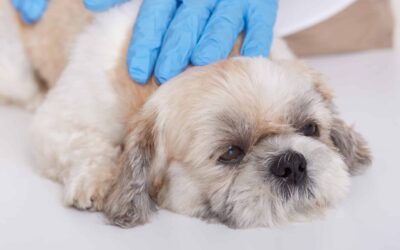Guide to Keeping Your Dog Hydrated

It’s important to keep your dog hydrated for their overall health and well-being. But it can be difficult to know how to do this as a pet owner, especially in hot weather or when they’re ill.
Dogs can be severely impacted by dehydration, causing major health issues. Let’s go over the significance of water for pets with some helpful advice on how to keep your dog hydrated.
Why Is Water So Important for Dogs?
The maintenance of a dog’s health depends critically on water. Animals, like humans, need water for vital bodily processes like digestion, circulation, and temperature control. Absorption of nutrients, waste removal, and joint lubrication are all facilitated by water.
What Is Canine Dehydration and When Does Canine Dehydration Occur?
When a dog’s body loses more water than it takes in, it becomes dehydrated. Numerous reasons, such as not drinking enough water, sweating excessively, throwing up, having diarrhea, or urinating excessively, can cause this to occur.
In order to act quickly and avoid future issues, it is crucial to recognize the signs of dehydration in dogs.
How to Identify Signs of Dehydration in Your Dog
For an early response, it is crucial to recognize your pet’s dehydration symptoms. Dehydrated dogs may exhibit the following symptoms:
- Increased thirst
- Dry gums
- Dim eyes and a lack of appetite
- Lack of vigor or sluggishness
- Sticky and dry nose
- Reduced skin elasticity
- Constant panting
- Reduced production of urine
When you notice your dog showing any of these symptoms, you should act right away to rehydrate them and seek medical attention if required. Dehydration can range in severity from mild to severe; in situations of severe dehydration, rapid veterinarian care is essential.
How Much Water Do Dogs Need?
Size, exercise level, age, and general health are just a few examples of variables that affect a dog’s water needs. A general rule of thumb is that dogs require one ounce of water per pound of body weight every day.
Since this varies, it’s important to keep an eye on your dog’s water intake and make any necessary adjustments. Dogs might require more water to be properly hydrated in hot weather or during times of increased activity.
How to Keep Your Dog Well-Hydrated?
Ensure Constant Access to Fresh Water
It is essential to ensure that your dog has continuous access to fresh, clean water. To prevent the growth of bacteria, make sure to clean and replenish their water dish every day. Set up several water bowls all over your house, particularly in spots where your pet spends most of their time.
Hydrate Dry Food with Water
If your dog mostly eats dry kibble, hydrate it with water by mixing it in with the food. To help them stay hydrated, this may help them drink more water overall. Simply sprinkle a little water over the dry food and let it soak for a few minutes before serving.
Create a Refreshing Retreat
Create a shady spot with a bed or mat so that they can unwind there. To encourage your pet to stay hydrated while taking advantage of the cool surroundings, place a dish of cool, fresh water in the area.
Indulge in Frozen Treats
Offering frozen treats to your dog is a fun way to keep them hydrated, particularly during the hot summer months. Homemade frozen treats can be created by mixing water with pet-friendly fruits like watermelon or strawberries, freezing the result in molds designed specifically for frozen treats for animals, and then serving the goodies. For your pet, the frosty treats give a delightful and refreshing snack in addition to hydration.
Enhance Hydration with a Pet Water Fountain
Some dogs have a natural attraction to running water, so a pet water fountain might help them stay more hydrated. A pet water fountain purchase is a terrific technique to encourage increased water consumption. Dogs are more likely to drink from these fountains because of the circulating water’s resemblance to a natural water source.
Keep Hydrated While Walking
Always remember to bring water for both of you while taking a dog for a walk, especially in the summer. Provide your pet with water when you take breaks using a foldable water bowl or a portable water bottle with a built-in dispenser. To avoid dehydration during physical activity or outdoor activities, let them drink frequently.
Fresh Vegetables in Their Diet
In addition to giving your dog water, you can help them stay hydrated by giving them more fresh vegetables. Cucumbers and celery are examples of veggies with high water content that can help your pet stay hydrated all throughout. Cut up these veggies into bite-sized pieces and give them to your dog as a treat or include them in their normal diet.
Drinks to Keep Your Pets Away From
It’s critical to be aware of which beverages are hazardous or detrimental to pets. Your dog shouldn’t consume the following beverages:
Alcoholic Drinks
Alcohol can seriously harm a pet’s health and is extremely toxic to them. Alcohol poisoning can occur in dogs, even from very little amounts of alcohol. Animals who have consumed alcohol may experience dizziness, drowsiness, vomiting, convulsions, and even coma. It is essential to keep alcohol out of your pet’s reach at all times.
Caffeinated and Sugary Drinks
Pet owners should avoid giving their animals caffeinated or sugary drinks like soda or coffee. These drinks may upset their stomach and make them throw up or have diarrhea. Caffeine use can make animals jittery, tremble, and have possible cardiac problems.
Consequences of Dog Dehydration: A Closer Look
Dogs’ health may be severely impacted by dehydration. Dogs are more likely to overheat, which can result in heatstroke when they are dehydrated. If untreated, heatstroke poses a serious risk to their health and can result in organ failure or even death.
It is never a good idea to overlook panting, which is a common indicator of heat exhaustion in dogs. To avoid serious health repercussions, it is crucial to comprehend the causes and symptoms of overheating in dogs.
Why Is My Dog Panting So Much?
Dehydration and hyperthermia are two conditions that can both cause excessive panting in dogs. If your dog is panting for more than 10 minutes after exercise, it can indicate a more serious health problem.
Is Overheating a Sign of Heart Problems?
Environmental factors might cause overheating, however, it’s crucial to understand that excessive panting from heat exhaustion or heat stroke can lead to cardiac arrhythmias in dogs. The signs of heart issues might also include disorientation and noisy breathing.
How to Respond in an Emergency Situation of Pet Dehydration?
Seeking early veterinarian care is essential if your pet is overly dehydrated or exhibiting severe dehydration symptoms. If unchecked, dehydration can cause major side effects, including organ failure, electrolyte imbalances, and even death.
A big financial hit may result from the effects of over-dehydration symptoms. Serious dehydration can be expensive to treat and intervene in using veterinary medicine. When it comes to this, Odie Pet Insurance Plans can be useful.
Odie’s Illness & Injury Plan
Odie’s Illness & Injury Plan provides coverage for a variety of illnesses, including emergencies involving dehydration. This plan offers financial support for emergency vet care and related treatments to get your dog back in good health.
Odie’s Accident Only Plan
Selecting Odie’s Accident Only Plan will provide you peace of mind knowing that your dog is covered in the event of sudden dehydration. You can receive up to $10,000 of yearly coverage for emergency veterinary visits, lab tests, and more.
Odie’s Wellness Plan
The basic preventive treatment that is covered by Odie’s Wellness Plan also makes sure that your pet has regular checkups and immunizations to preserve their general health and hydration. It’s an add-on that’s compatible with any Odie pet insurance plan that will help you ensure your pet’s health throughout the year.
FAQs
What to Do When Dogs Won’t Drink Water?
Try the following advice if your dog is not getting enough water:
- Make sure that the water is clean and fresh.
- Consider switching the water bowl’s placement or design.
- Provide water in various forms, such as from a pet fountain.
- To persuade them to drink, combine water with wet food or add low-sodium chicken broth.
Can Dogs Drink Anything Besides Water?
Dogs need water to stay hydrated, however, depending on their species, some animals may also drink other liquids. Alternative liquids must be secure, non-toxic, and appropriate for their particular requirements, nevertheless. To get advice on the best options for hydration for your pet, it’s best to speak with a veterinarian.
Does Saltwater Hydrate Dogs?
To keep dogs hydrated, saltwater should not be fed to them. Due to the risk of electrolyte imbalance and dehydration in dogs, salt water is not healthy for intake. Salt poisoning and potential death can result from ingesting salt water. Fresh, clean water should always be available to your dog so that they may stay hydrated.
Is Yogurt Hydrating for Dogs?
A dog’s diet can benefit from the inclusion of yogurt, but it shouldn’t be their main source of fluids. Although yogurt has water in it, a dog’s needs for hydration are not sufficiently met. Your dog should always have access to water, and yogurt can be provided as a treat on occasion or as a part of a balanced diet.
What are Signs of Pet Dehydration?
Pet dehydration symptoms include increased thirst, dry mouth, lack of appetite, sunken eyes, sluggishness, dry nose, loss of skin elasticity, decreased urine production, and panting (in dogs). Take quick action to rehydrate your pet if you detect these signs, and if required, seek medical advice.
Will Milk Hydrate Dogs?
Despite the fact that milk may be a beverage that dogs like to drink, it is not suggested for this purpose. Most mature dogs lack the required enzymes to digest lactose. Dogs who consume milk may also experience digestive problems like diarrhea and stomach pain.
Can Dogs Drink Rainwater?
While drinking rainwater is generally harmless for dogs, it’s necessary to take into account the surroundings where the rainwater gathers. The well-being of your pet may be in danger if rainwater gathers in spots where pesticides or toxins may be present. For their well-being and hydration, it is best to give your pet access to clean, fresh water from a reputable source.
Is It Safe to Give Dogs Bottled Water?
Dogs can drink bottled water without any problems, but it’s important to read the label to make sure there are no dangerous additions or minerals that could be bad for their health. If you decide to give your pet bottled water, look for companies that offer filtered or purified water free of extra chemicals or minerals.
Can Dogs Drink Tap Water?
Typically, dogs can drink tap water without any problems. However, the chlorine or other compounds in tap water may cause certain dogs to be sensitive to its flavor or odor. Try filtering the water or providing fresh, clean water from another source, such as a pet water fountain, if your dog refuses to drink tap water.
Do Dogs Prefer Cold Water?
When it comes to the temperature of their water, dogs have different preferences. Some dogs prefer cold water, while others prefer it at room temperature. It’s better to watch your pet’s behavior and provide water at a temperature they like. Add a few ice cubes to their water bowl to keep it cool if they seem to prefer cold water.



